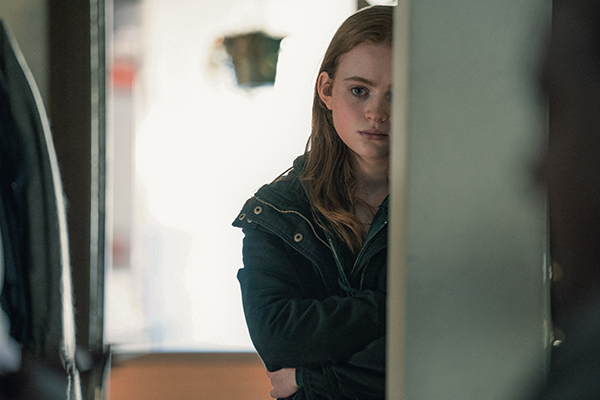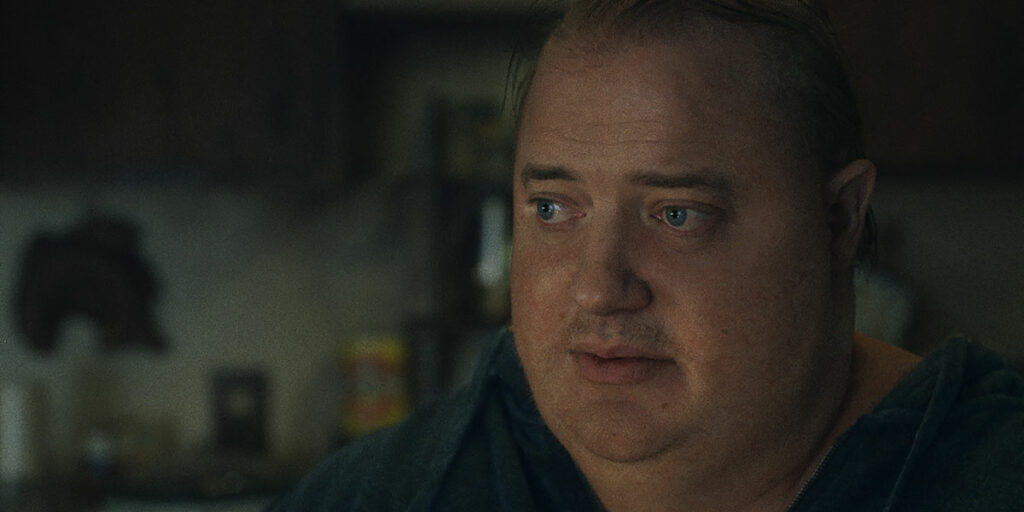The Whale sees Brendan Fraser excel in Darren Aronofsky’s upsetting, heartbreaking tale of grief, physical struggles, and emotional neglect.
This is it! The Whale! The movie that got Brendan Fraser a six-minute standing ovation at Venice! Surely that’s in no way an over-the-top exaggeration of its quality that sets expectations no film could ever live up to! Seriously, I was taken aback by just how huge the hype around The Whale has been. Darren Aronofsky is one of my all-time favorite filmmakers, so I was excited to see his newest film, but even I was wary going in that such feverish buzz wouldn’t be warranted… But if any film at this festival had to get such buildup, The Whale is probably the most warranted choice.
Brendan Fraser stars as Charlie, an online teacher who suffers from crippling morbid obesity, which has made him unable to walk without a crutch and given him increasingly worse heart failure. The entire film takes place in his house over the course of a week as he’s repeatedly visited by three people: his loving but weary best friend and nurse Liz (Hong Chau), his bitter, his estranged daughter Ellie (Sadie Sink), and a well-meaning religious zealot named Thomas (Ty Simpkins) who hopes to convert him to Christ. As their visits continue and intersect, we learn more about Charlie’s past, what put him in this condition, and what he hopes to achieve as his life seems to be dangerously close to its end.
There’s no point in beating around the bush regarding the biggest, most hyped-up selling point of The Whale: Brendan Fraser. He’s pretty much guaranteed a Best Actor nomination for damn good reason. Every second he’s on screen makes your heart break more and more for his character, especially due to Frasers’s physical performance. Through all the makeup and prosthetics, Fraser amazingly conveys how terrifyingly strenuous all but the tiniest of Charlie’s movements are. Just the simple act of him walking through a hallway, barely staying upright and so visibly struggling, is enough to make you grip recoil in anxiety. Whether it be his ravenous hunger, constant sweating and labored breathing, or hopeless crying breakdowns, the depiction of this level of obesity and its subsequent health problems is graphic and constantly hard to watch. You understand how much pain he’s going through just by looking at him, even before you know his history.
The title The Whale refers to the whale in Moby Dick, which is the subject of a student’s essay that Charlie regularly reads. A whale which, as the film addresses, is hunted out of a man’s selfish and futile efforts for self-fulfillment. Charlie himself fits this mold, with almost everyone in his life taking advantage of his deteriorating state for their own desires that they think will make them better off. Even Charlie mistreats himself to achieve his own personal goals. All throughout The Whale, it’s very easy to see that he doesn’t value his life as much as he should, with him constantly apologizing despite doing nothing wrong and constantly refusing more advanced medical care. We eventually learn the very sweet yet very depressing reason why he’s so unwilling to get help, which has its own set of tragic implications of how he’s viewed by others as well as himself… whether it’s intentional on anyone’s behalf or not.

It’s like Charlie’s physical state is a visual manifestation of all the hurt he’s been through, all the damage that’s been done to him by others in his life, and the shamble of a man he’s become through his own grief. He’s made clear mistakes in the past that show his deep imperfections, but it’s hard to hold those against him when you see his daughter constantly berate and treat him like trash to the point of abuse, or when Thomas remains harmfully ignorant of what kind of spiritual lifting Charlie truly needs. But then when you learn more about both of these two visitors, including where they come from and what they’ve been living with, you can at least understand where even their ugliest behaviors are coming from, even though you strongly disagree with it. Every performance in The Whale is tragic and uncomfortable, and every confrontation either brings out the darkest sides of these characters or shows how much their faint humanity is fighting to not get consumed.
Thomas in particular is the perfect representation of so much of the wrong that’s been done to Charlie up to this point, which largely centers around religious mistreatment and the trauma that comes when such institutions try to tear apart who a person is at their core. Thomas’s selfish motivations also reflect the kind of emotional and intellectual dishonesty that Charlie grows increasingly angered by throughout the film. He tries so desperately to maintain what little is left of his dignity, but even he has his breaking point, and he becomes more emboldened by the hypocrisy around him and a true understanding of what’s really important in life, bringing light and a chance for happiness out of a slew of darkness. The final few minutes of The Whale are guaranteed to bring massive lumps to the throats of nearly everyone who watches it. The performances, the final reveals, a character’s last major feat, and a brief but powerful visual representation of what’s happening, all leave you on the most hard-hitting, soul-shattering note of a film that’s already packed with such notes.
Matthew Libatique has always been Aronofsky’s go-to cinematographer, and The Whale continues to show why he’s one of the best in the business. The house Charlie spends the entire film in is shot and lit like his own personal purgatory, shrouded in muted darkness that reflects where he is in life. What little light does sneak in through the door and windows, by contrast, is constantly bright, almost heavenly, signifying a brighter world beyond what he’s festering in that he either can’t enter or refuses to enter. This may sound strange, but my favorite part of The Whale outside of Fraser’s performance is its aspect ratio. The film was shot in 4:3, which is so brilliant because of the tighter width that makes Charlie’s body take up a larger proportion of the frame, which enhances our perception of his size and brings us literally closer to his plight. And with how, as is typical with Aronofsky, absolutely no punches are pulled in showing the most miserable and scarring aspects of his life and condition, all of this makes The Whale extremely difficult to watch from start to finish.
As the credits to The Whale rolled, and Rob Simonsen’s swelling, overwhelmingly emotional score played the film out, I left the theater deeply shaken up. This is a film that will slowly beat your heart down, begin to rebuild it, and then break it again, before finally leaving it in an achingly bittersweet place. The film leaves you feeling dirty in many ways but strangely enlightened in others. Brenden Fraser gives an outstanding performance for the ages, but he’s just one factor in what makes The Whale such a brutal, profound, unforgettable experience. This is one of the best films of the year, and yet another phenomenal entry in Darren Aronofsky’s filmography. He’s made several films that have gone on to be considered classics of 21st century cinema. Requiem for a Dream, Black Swan, The Wrestler… and now, I’m sure, The Whale has begun its path to achieve that same status.
The Whale premiered at TIFF on September 11, 2022, and will be released in US theaters on December 9 and in UK cinemas on February 3, 2023.

